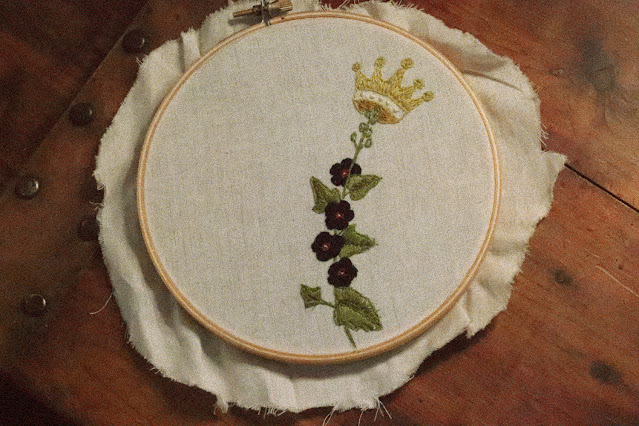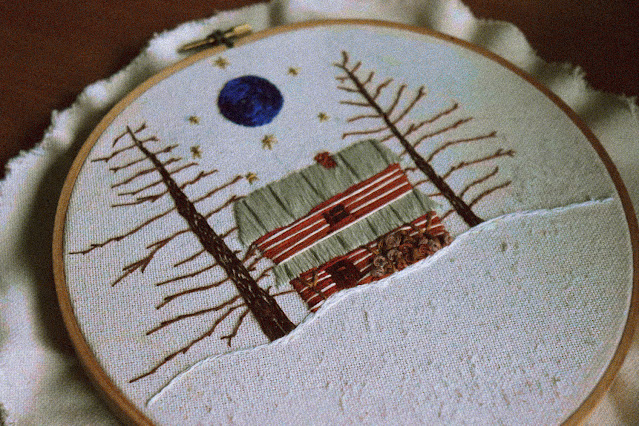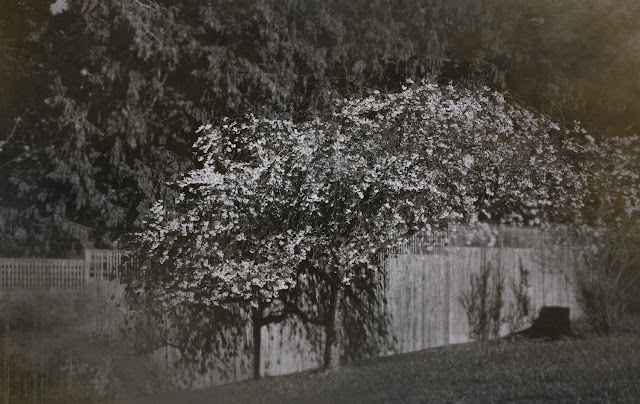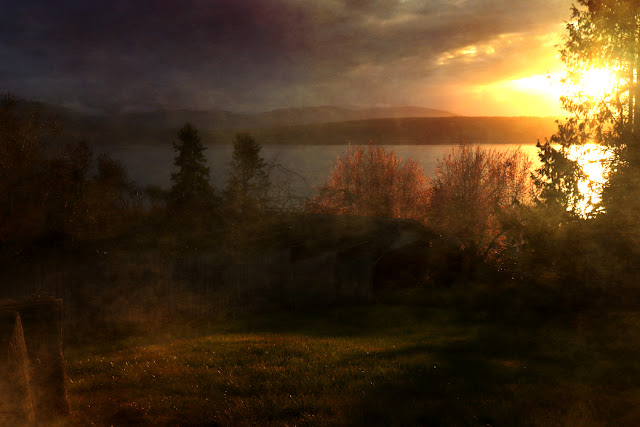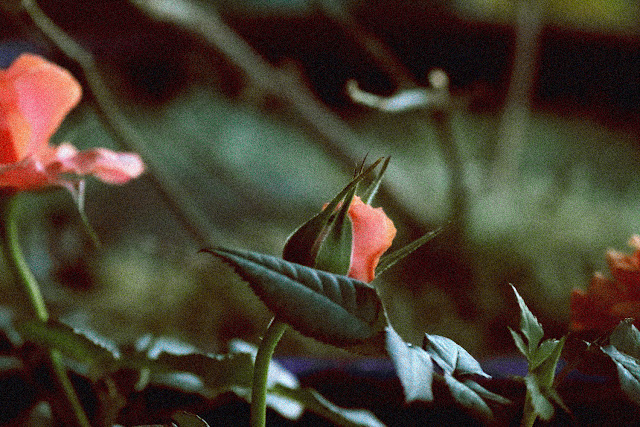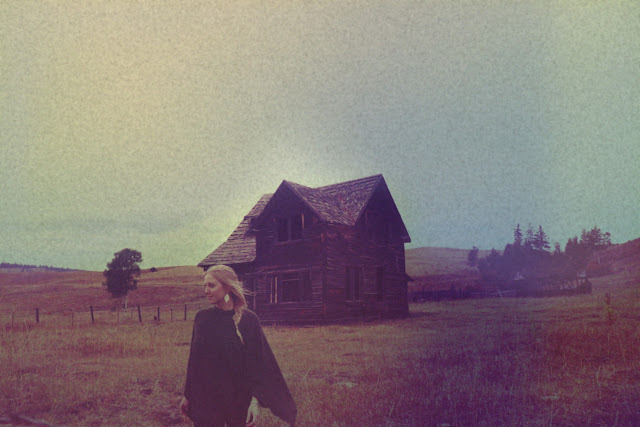Monday, November 30, 2020
To what degree are we living in illusion?
Saturday, November 28, 2020
A Yule tree of fallen limbs
The dark season here by the sea means not only short foggy days, but frequent 60mph winds too. Gales stampede in off the north Pacific and thrash against the house, so much so that our musical instruments sometimes make sounds from the vibration alone.
Power outages are common a few times a month from mid-Fall until mid-Spring.
And I love it!
Blue skies sort of carry an extroverted feeling with them, almost demanding of busy-ness and doing. The misty moody days suit me best.
So last week after the winds had settled a bit and I felt brave enough to venture outside again, I found--to my delight--many downed branches scattered all around. On the drive to town to grab some milk and stop by the post office, I pulled over several times, put the car in park, and stuffed the back of my vehicle with large fallen Douglas Fir branches.
They've been lying on the little stoop outside the back door and a few mornings ago I even noticed bobcat prints beside them! I s'pose they do make good habitat for creatures looking to get some shelter from the winds and rains.
Then this morning I finally carried out what I had planned for them-- a Christmas tree!
I sawed off the bottoms a little, positioned them inside a 5-gallon bucket, put handfuls of rock in to help hold them steady, and used a few lengths of string to tie them together into a tree-like bundle.
I dug around and found a strand of battery-operated lights not being used, strung those, then found an old skirt I don't wear anymore to hide the bucket.
And now we have ourselves a fine little Yuletide tree, completely free and "eco-friendly." It does need ornaments and I'll try to get around to making a few soon. But I'm quite pleased with the simplicity and handmade-ness of it as-is. Now off to clean up my mess and see what else the afternoon holds...
Thursday, October 29, 2020
Wednesday, September 9, 2020
Folk embroidery
Years ago, I started embroidering. I'm not sure why I was drawn to it, but it's evolved to the point that I now always have an embroidery sitting around I'm working on. Just like a book you're currently reading. Little by little, you finally complete it.
I'd call myself an outsider or folk artist because I'm not trained, and in fact I'm not even sure if what I do is technically embroidering or something else altogether.
Despite, I really enjoy it.
Last night I finished one and I thought I'd share it here. It's a black hollyhock, my favorite flower alongside poppies, wearing a crown. Or does the crown wear the hollyhock? I can't say for sure just yet...
And here are some others I've completed in the last year...
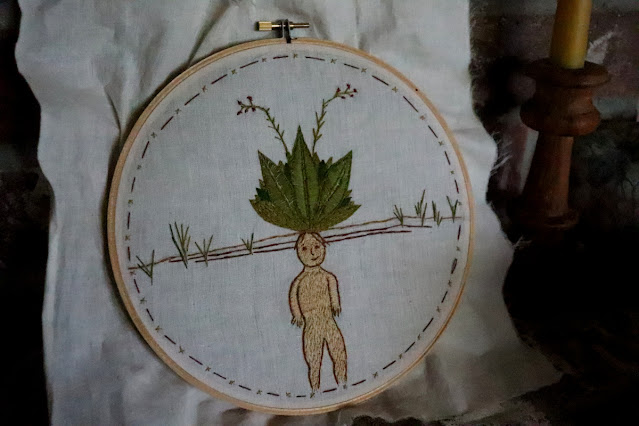 |
Sunday, August 16, 2020
Revolt Against The Modern World, Chapter 2 - Regality (Notes)
In this chapter, Evola discusses how kingship was viewed in the pre-historic world of Tradition. He also provides various descriptions of what constituted a good leader, and what still constitutes a good leader if you believe these principles to be axiomatic and enduring.
This chapter can be difficult, or triggering, for the modern mind which touts democracy as the most superior form of governance. We are accustomed to living in an age that worships the common man, where decisions are made by the whims of the masses.
But in pre-historic societies, kings were loved and revered and viewed as a source of true inspiration and as a link between the physical and metaphysical. It was essential the king have a strong connection to the Transcendent in order to be a respected ruler that the people could trust to act as a bridge, or pontifex, between the material and spiritual realms.
I've selected some passages from this chapter (in italics), paired with my own notes (non-italics), to help illuminate the ways in which regality was viewed in Traditional societies.
___________
________
_____
"Every traditional civilization is characterized by the presence of beings who, by virtue of their innate or acquired superiority over the human condition, embody within the temporal order the living and efficacious presence of a power that comes from above."
In understanding the nature of a true King, it's of paramount importance to grasp that it was the inner nature of a man which brought about his regality. We aren't speaking of a kingship that is simply handed down through a bloodline. The position was very much earned.
"Pontifex means 'builder of bridges,' or of 'paths' connecting the natural and supernatural dimensions. The pontifex was traditionally identified with the king. Servius, a late fourth-century commentator on Virgil's works, reports: 'The custom of our ancestors was that the king should also be pontifex and priest.' A saying of the Nordic tradition reads: 'May our leader be our bridge.'"
"Thus, real monarchs were the steadfast personification of life 'beyond ordinary life.' ... These influences [of the monarch] permeated people's thoughts, intentions, and actions, ordering every aspect of their lives and constituting a fit foundation for luminous, spiritual realizations."
"Traditional civilization, unlike those of decadent and later times, completely ignored the merely political dimension of supreme authority as well as the idea that the roots of authority lay in mere strength, violence, or natural and secular qualities such as intelligence, wisdom, physical courage, and a minute concern for the collective material well-being. The roots of authority, on the contrary, always had a metaphysical character."
"In an ancient Indo-Aryan text it is written: 'The dignity a god enjoys on earth is splendid, but hard to achieve for the weak. Only he who sets his soul on this objective, is worthy to become a king.'"
In a sense, the King was the idyll- an ultimate role model, a motivation for people. It didn't matter a person's place in society, they devised a noble path for their own role, rather than aspiring to be something else or something more. This is a side tangent, but I do think it's worth thinking on- that is, the notion of desire. Today, we desire to climb the ladder and to become something more, always looking to some future point when we will be more, have more. Hindus value the caste system, and this was a system common in pre-historic cultures too. This sort of system, knowing one's place in society, helped rid the mind of desire, and individuals were free to pursue a path of transcendence whether they were king, butcher, priest, milkmaid, monk, or blacksmith. Contrast this with the striving for material gain so common now in the modern world.
"The ultimate aim [of a Traditional community] would be to achieve a society in which every individual was living in a state of high vibration." (source)
Moreover, a nations fortune or misfortune was thought to be dependent on the kings behavior and inner metaphysical state:
"The common assumption was that the fortunes or misfortunes of the kingdom, as well as the moral qualities of his subjects (it is the virtue in relation to the being of the monarch, and not his actions, that carries positive or negative influences on them), secretly depended on the monarch's behavior. The central role exercised by the king presupposed that the king maintained the aforesaid triumphal inner way of being."
Contrast this to modern times when we feel rulers should be help accountable by the people. In Traditional times, it was thought that the King was held accountable by God (note that by using this term I'm not referring to a Christian God, but God as the divine foundation from which all physical and metaphysical spring. I'll be able to elaborate on this in the future after I've spent more time studying the Vedas).
Veda and Physics: The Science and Technology of the Unified Field
The unified field discussed in this insightful lecture can be experienced in meditation. And if felt in meditation enough, can be connected to throughout daily life.
Tesla, who was highly influenced by Vedic philosophy, [re]discovered the unified field theory shortly before his death.
Tuesday, March 31, 2020
Revolt Against The Modern World; Chapter 1 - The Beginning (Notes)
Tuesday, March 24, 2020
Revolt Against The Modern World: Foreword (Notes)
Notes from Revolt Against The Modern World: Foreword
> ..."there are causes that have been active for centuries that have contributed to spiritual and material degeneration. These causes have not only taken away from most people the possibility of revolt and the return to normalcy and health, but most of all, they have taken away the ability to understand what true normalcy and health really mean."
> "The only thing that matters is the silent endurance of a few, whose impassible presence as 'stone guests' helps to create new relationships, new distances, new values, and helps to construct a pole that, although it will certainly not prevent this world inhabited by the distracted and restless from being what it is, will still help to transmit to someone the sensation of the truth--a sensation that could become for them the principle of a liberating crisis."
> "...reference to the spirit of universal civilization, on the ruins of which everything that is modern has arisen..."
Here, Evola is speaking to principles that were found throughout all ancient cultures, despite the geographical location, race, or specific religion. My opinion and thought at this point is that Vedic philosophy is one such example -- the most ancient spiritual/philosphical worldview that is known of today, an oral tradition which was first written down in Sanskrit, and which is the source of all other religions worldwide. If we look back to things such as this, Evola posits that we find foundational principles and therefore truths. It's also worth mentioning that Veda was a worldwide view, there are remnants of Vedic philsophy in Ireland and Russia, though many modern people associate Vedic philosophy with Indian Hinduism alone, this is not accurate.
> "...the first forces of decadence began to be tangibly manifested between the eighth and the sixth centuries B.C., as can be concluded from the sporadic and characteristic alterations in the forms of the social and spiritual life of many peoples that occurred during this time."
Here, Evola is defining what he means by modern, essentially everything in recorded history is modern. So the distinction between Traditional and Modern is the distinction between pre-history and history, between mythological and scientific, between non-linear time and linear time, all respectively.
To study and try to understand this work, I need to radically change my method and mentality, which is heavily influenced by Modernity.
"...the whole body of traditional civilizations, is characterized by the feeling of what is beyond time, namely, by a contact with metaphysical reality that bestows upon the experience of time a very different, 'mythological' form based on rhythm and space rather than on a chronological time."
So the emphasis on the distinction between metaphysical and physical cannot be overstated when distinguishing between the relationship that Traditional civilizations had with reality, versus Modern civilizations.
>"...wherever a civilization is manifested that has at its center and substance the temporal element, there we will find a resurgence, in a more or less different form, of the same attitudes, values, and forces that have defined the modern era in the specific sense of the term; and that wherever a civilization is manifested that has as its center and substance the supernatural element, there we will find a resurgence, in more or less different forms, of the same meanings, values, and forces that have defined archaic types of civilization."
Again- Modern versus Tradition is about principles, not linear timelines. Temporal represents Modernity, Supernatural represents Archaic/Tradition.
>It needs to be made clear Evola's stance on science and epistemology (how we know what is true):
"The above remarks will suffice to show how little I value all of what in recent times has officially been regarded as 'historical science' in matters of religion, ancient institutions, and traditions, nor do I need refer to what I will say later concerning the origin, the scope, and the meaning of modern 'knowledge.' I want to make it clear that I do not want to have anything to do with this order of things, as well as with any other that originates from modern mentality; and moreover, that I consider the so-called scientific and positive perspective, with all its empty claims of competence and of monopoly, as a display of ignorance in the best of cases."
Though Evola does not deny that science and modern means of accruing information are altogether useless-
"I certainly do not deny that from the detailed studies of the 'scholars' of different disciplines what may emerge is useful (though unrefined) material that is often necessary to those that do not have other sources of information or who do not have the time or intention to dedicate themselves to gather and to examine what they need from other domains. And yet, at the same time, I am still of the opinion that wherever the 'historical' and 'scientific' methods of modern man are applied to traditional civilizations, other than in the coarser aspect of traces and witnesses, the results are almost always distortions that destroy the spirit, limit and alter the subject matter, and lead into the blind alleys of alibis created by the prejudices of the modern mentality as it defends and asserts itself in every domain."
"...from the perspective of 'science' what matters in a myth is whatever historical elements may be extracted from it. From the perspective that I adopt, what matters in history are all the mythological elements it has to offer, or all the myths that enter into its web, as integrations of the 'meaning' of history itself."
Evola goes on to provide an example to illustrate his meaning: "Not only the Rome of legends speaks clearer words than the historical Rome, but even the sagas of Charlemagne reveal more about the meaning of the king of the Franks than the positive chronicles and documents of that time, and so on."
>"Those who begin from a particular traditional civilization and are able to integrate it by freeing it from its historical and contingent aspects, and thus bring back the generative principles to the metaphysical plane where they exist in a pure state, so to speak-- they cannot help but recognize these same principles behind the different expressions of other equally traditional civilizations. It is in this way that a sense of certainty and of transcendent and universal objectivity is innerly established, that nothing could ever destroy, and that could not be reached by any other means."
I like this because Evola reiterates that we are looking to Tradition for principles, and that as we start to see the same principles span different times and cultures, we can use these universal principles to hone in on truths. This makes a lot of sense to me.
>Evola clarifies that he will pull from Eastern and Western traditions, depending on which best illustrates the point. This does not make him of that belief, but is merely being used as a tool. This deserves to be clarified as many people will quickly associate an author with a certain spiritual or religious group, and then write them off as believing in something other than they themselves do if that's the case. Again, Evola will use a myriad of spiritual and religious cultures and beliefs to illustrate fundamental principles.
"In the course of this book I will refer to various Eastern & Western traditions, choosing those that exemplify through a clearer and more complete expression the same spiritual principle or phenomenon."
>"In the first part, I will trace directly a kind of doctrine of the categories of the traditional spirit; I will indicate the main principles according to which the life of the man of Tradition was manifested."
"The forms and the meanings indicated should not be regarded as 'realities' proper... but rather as ideas that must determine and shape reality and life, their value being independent from the measure in which their realization can be ascertained, since it will never be perfect."
Here, Evola seems to be almost reassuring us that the realization of the value will never be perfect, assumingly meaning were we to endeavor for it, but the value or principle remains as the goal, the truth.
Thursday, March 12, 2020
Revolt against the modern world
To prepare, I've been listening to a series on Youtube, which I'll link to below. Here are some initial notes.
The degeneracy of the modern world-- frenetic energy without purpose.
What is the aim of modern man? To create an exact replica of himself (AI) with no soul as his crowning achievement? This in itself is a symptom of the plague of modernity: no higher purpose, dogmatic attachment to the physical.
What is meant by modern? To Evola, we can begin seeing the forces of modern decadence around 8,000 BC, with a second phase occurring during the Roman Empire with the advent of Christianity, and a third phase during the feudalism of the Middle Ages. From there, a rapid downward trajectory began.
If modernity encapsulates all of this time, then where do we find Tradition?
Evola says we must look to pre-historic civilizations; the mythological.
According to Evola, to understand we must imagine our way out of linear time, as pre-historic civilizations would not have had the same kind of linear relationship with time that modern civilizations do, due to the daily connection they had with the metaphysical, which is on a different dimensional plane than our physical one. This linear experience of time is a key feature of modernity.
When looking for the world of Tradition, it's imperative to try to understand time through this pre-historic lens.
Disconnect from the metaphysical, from the transcendent, is a large part of the degeneracy of modernity. Epistemological Materialism is everything to modern man. Even our own Science stumbles upon the quantum world, finally!-- Materialism brushes up against the Metaphysical and yet it's called one of the most controversial "problems" in modern physics. Having many possible quantum states, as wave functions do, seems to point to a non-linear nature of time. (To learn more about quantum physics, which might be our first true observation of metaphysics, however paradoxical that sounds in language, this is a good starting point as is the book The Quantum Enigma).
Thursday, March 5, 2020
Tree of Life
If ever there was a movie that captured the inner workings and relationships and patterns that compose my own thinking patterns and inner world associations, it's this one.
This is an abstract topic, so I guess it's only natural to find it difficult to use language, which is logical, to describe exactly what I mean.
But bear with me while I try...
Throughout any given moment in life, we have continuous thoughts-- some are ruminations, some are mundane day to day, and some are higher level such as when we get moved to epiphanies unexpectedly, or when the day is just right and we experience a euphoric state on a regular afternoon walk.
Just now I have finished dancing in the kitchen, after feeling infused with something--- beauty? inspiration?--- from seeing the new pink blossoms on the redbud trees swaying in the wind. I'm not sure what that is. And somehow these "good" feelings don't always involve "good" thoughts. Sometimes thoughts of death, of suffering, of the terrible nature of reality, can also blend in but still produce this result of inspiration and of somehow touching divinity.
It is really hard to explain.
But, this movie, Tree of Life, some of the scenes in it reminded me of my own thoughts. Isn't that strange? I've never had this experience when watching a film. I mean, of course there are films that feel familiar, like Amelie's daily life and small amusements, but this is a different level. More subtle and ethereal.
I especially loved the timelines, how flashbacks to early pre-human earth would happen randomly, which might confuse a lot of viewers, but how it made perfect sense to me in the overall storyline.
I should take the time to expound more on this, because the experience was fascinating, but I must hop along now.
If you haven't watched this film, here is the trailer, test it, see what you think. I hope you watch it.
A good conversationalist
I think talking about oneself or one's preferences or experiences can be done in a way that considers the other person more, though. It can be done in a way that is interesting. For example, instead of only stating my love of hummingbirds, I could go on to talk about the objective qualities of the hummingbird, what intrigues me about them. This opens up conversation, rather than just saying "Oh yes, *I* love hummingbirds. Hummingbirds are *my* favorite!" (How interesting is that?) You could instead say something like "I love hummingbirds! Did you know that the Anna's Hummingbird overwinters here in the Pacific Northwest; it doesn't migrate like all of the other hummingbirds. I wonder how they cope when the temperatures plummet?"
You're able to state your love of hummingbirds, but also add value by presenting interesting objective information, as well as engage the other person, giving them a chance to provide feedback. Hitting the ping-pong ball rather than catching it.
This creates a more inspired and energized exchange, as opposed to "Oh I love hummingbirds! Hummingbirds are MY favorite!"
To develop self-awareness about if you do this or not, or why you feel bored in conversation with certain people, it can help to examine how many statements begin with "I...." or "My..." without ever leading into something more objective or engaging.
None of this really matters unless it's someone you spend a significant amount of time with. And of course if you're specifically discussing something very you-centric, this doesn't apply either.
This is more a quibble I have about people I'm around often, and why I notice feeling bored in conversation with them.
Wednesday, February 26, 2020
Lightheartedness
One is the person whose nature is predisposed to be this way, despite external events.
The next is a person whose lightheartedness stems from naivete. This naivete comes from lack of experience, and lack of negative experiences in particular. The world feels safe and loving and there isn't much to worry over.
The third kind of lightheartedness, which is my favorite and so of course the category I identify with most, is the person who has gone through dark nights of the soul, come out the other end, and made the choice not to exist in gloom or suffering, but has chosen to be cheerful and optimistic, despite all reasons to the contrary. Reasons which they are intimately familiar with.
When we observe this character trait in others, we can't possibly know which category they fall into. This would take an intimate knowing of the person and their experiences.
Just to be clear, when I speak of lightheartedness, I'm not referring to an empty "positivity" which is so encouraged by our society, or a fleeting mood of "happiness". I'm talking about a light heart which contains depth, so this lightheartedness might show up as serenity, kindness, looking on the bright side, assuming the best of others, a well of strength the person can siphon from during the darkest of times. Lightheartedness isn't always obvious.
 |
| Last weekend, enjoying time with my friend Meg near beautiful Deception Pass. |
Tuesday, February 18, 2020
Thoughts on humility
As I move through the years and continue to develop more and more self-awareness, it causes me to reflect on society at large; the environment around me that influences so much of who I am.
No matter how individual and self-aware we consider ourselves to be, a substantial percentage of this 'self' we identify as is a pure result of what we see around us. We are constantly receiving cues from the rest of the herd, and this shapes our behavior and our minds, even if we fancy ourselves contrarian in thought and action.
The essence of humility seems to come from a place of service. Service to what? It doesn't seem so much as service to someone as it does service to some higher ideal. (So, to illustrate what I mean by that, I believe that while parents can be a wonderful example of humility, the higher ideal presupposes the daily acts of humility).
Humility could be a great act of service in the Western world where the prevailing attitudes are abrasive, loud, competitive, and self glorifying.
Maybe because they are more rare these days, I find myself taken aback by those who embody gentler characteristics of beauty such as humility, grace, calmness, and sincerity. There is a goodness that shines through if you have eyes to see it and a heart and mind to recognize that kind of quiet and subtle strength.
While I'm interested in the outward appearance of humility for its potential ripple effect, I'm more curious about the inward experience of humility. What does humility feel like? Here are a few things that come to my mind to start me thinking on it more:
Humility feels like--
- the opposite of perfectionism
- the opposite of self importance
- acceptance of what is rather than resistance
- absence of self-righteousness, or perhaps all righteousness
- internalization that you are fallible, and so are others
- being fixed toward higher ideals and morals; not governed by emotional whims and moods
- a mode of listening and receptivity rather than feedback and penetration
- lack of criticism
Muses of humility?
- Taka, the female lead on The Last Samurai movie
- Agafia Lykov, perhaps
- ...
Tuesday, February 4, 2020
Sublimation
Today I listened to this YouTube video about the nature of beauty and suffering and what really stuck with me were Zapffe's four primary coping mechanisms which humans use to avoid dealing with the weight of existence. They are:
1. Isolation - where we completely dismiss all disturbing thoughts and feelings
2. Anchoring - which seem to give value and purpose to life and give us a fixed place within the construction. Examples of anchoring are religion, church, government, morality, fate, and other people.
3. Distraction - where we focus all of our energy on tasks and ideas to prevent the mind from turning in on itself.
4. Sublimation - which is the refocusing of energy away from negative outlets, toward positive ones. Those who tend toward sublimation distance themselves and look at existence from a more aesthetic point of view.
While I do believe that all four coping mechanisms have a degree of overlap, and most of us employ all of them, I like to think the one that describes my approach to life most of the time is sublimation.
What about you? What do you think?




